Uncategorized
Rabbi Mayer Moskowitz z”l, on Hasidic life in pre-war Czernowitz
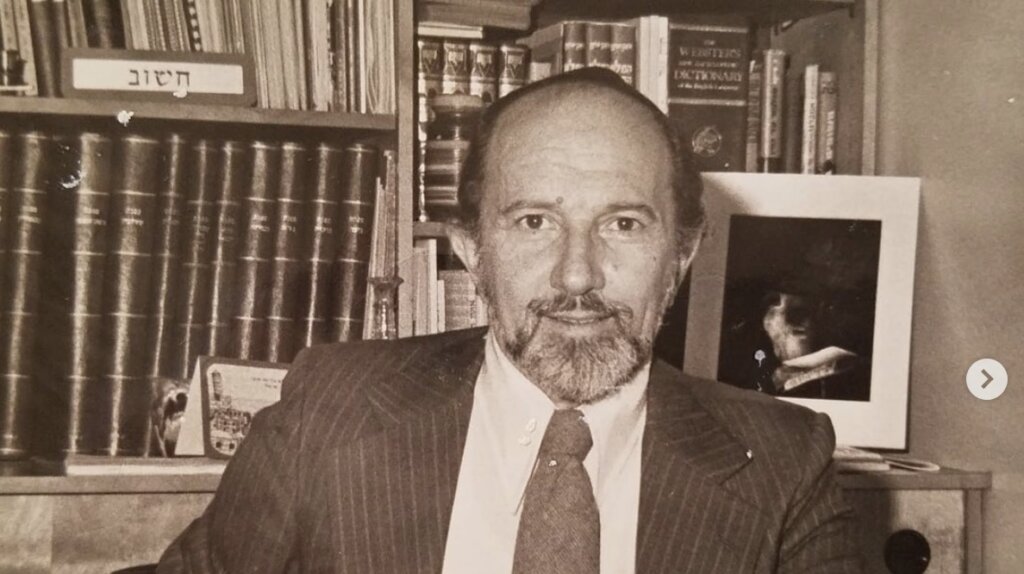
[The following is an English version of the original Yiddish article, which you can read here.]
Rabbi Mayer Moskowitz, a beloved longtime educator at the Ramaz School in New York and the Hebrew-immersive Camp Massad, and author of the book A Memoir of Sanctity, has passed away.
In 2010, I interviewed Rabbi Moskowitz to learn what the Hasidic community was like in the city where he was born and raised — Czernowitz (Chernivtsi), then part of Romania, and today Ukraine.
Most contemporary scholars of East European Jewish history focus on prewar Czernowitz as a hub of intellectual and cultural Jewish life; as the location of the first Yiddish conference in 1908; as the milieu where the poet Itsik Manger and fabulist Eliezer Shteynbarg produced their greatest work.
But as the oldest child of the Shotzer Rebbe — Avrohom Chaim Moskowitz, Mayer Moskowitz had a very different perspective of the city, describing it as a center of five Hasidic dynasties and a vibrant Orthodox Jewish community.
I met Rabbi Moskowitz through my son, Gedaliah Ejdelman, who was a student in his class on halacha (Jewish law) at Ramaz Upper School. The following anecdote gives you an idea of the kind of person Rabbi Moskowitz was:
On the day before the final exam, one student asked if he could write his answers in English rather than Hebrew. Half-jokingly, the rabbi told the students that they could respond in any language they wished.
Gedaliah raised his hand and asked if he could write in Yiddish. “Sure,” Rabbi Moskowitz said. So Gedaliah did, citing Rashi and other commentators in mame-loshen. Moskowitz was so delighted by the Yiddish responses that he shared them with his colleagues.
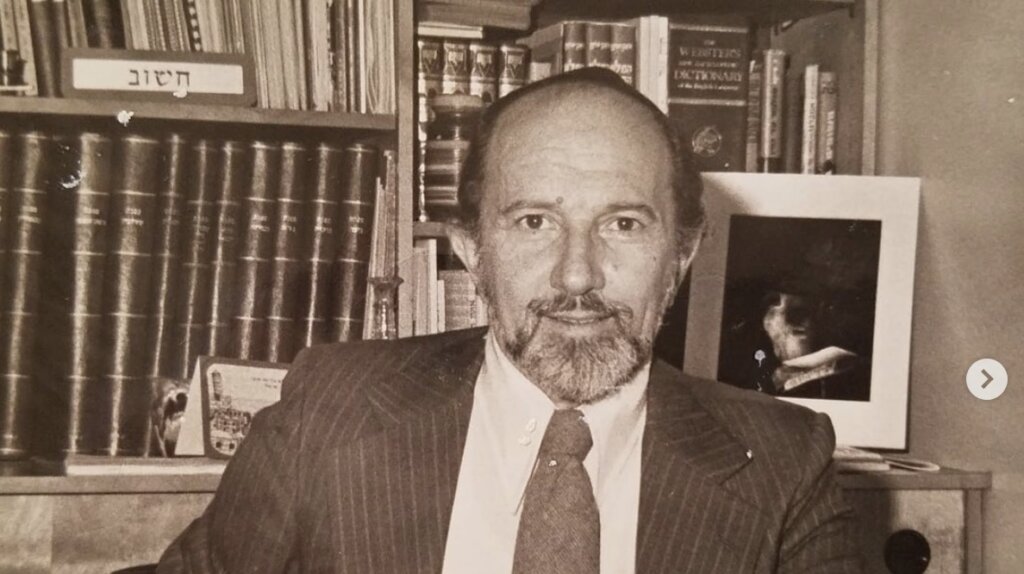
When I met with Rabbi Moskowitz in his Upper East Side apartment in Manhattan, I asked him what life was like in Czernowitz. He told me he was born in 1927, a son — in fact, the only son — of the Shotzer Rebbe, Avrohom Chaim Moskowitz. He explained that Czernowitz had no less than five Hasidic dynasties. Besides his father, there was the Boyaner Rebbe; the Nadvorner Rebbe; the Zalischiker Rebbe and the Kitover Rebbe.
“All the Rebbes were related because the marriages of their children were arranged solely with other rabbinical families in Czernowitz,” he said.
Every Rebbe had his own court of Hasidim but there were marked differences between the Rebbe and his worshippers. The former wore beards and peyes (Yiddish for sidelocks) and donned a shtreimel for the Sabbath and holidays, while their worshippers, seeing themselves as “modern Jews,” were clean-shaven and came to services wearing a tsilinder (top hat) and tailcoat.
“I myself had little peyes,” Rabbi Moskowitz said.
His family lived in the same building as his father’s shul. His mother, Alte Sheyndl, was a daughter of the Pidayetser Rebbe, so she wore a sheitel. But, like the other rebishe kinder (Rebbe’s children), she was apparently influenced by the cosmopolitan character of the city. In contrast to her husband who spoke Yiddish with their children, the Rebbetzin spoke German. She went to the theater, read secular Yiddish poetry and shook men’s hands. On Mother’s Day, little Mayer would bring her a bouquet of flowers and on New Year’s Eve the Rebbetzin and the other daughters of rabbinical families threw a party.
“On New Year’s Eve they came to our apartment on the second floor, elegantly dressed, ate and spent many hours together,” Rabbi Moskowitz said. “Although they didn’t drink any alcohol, the daughters-in-law of the Bayoner Rebbe smoked thin cigarettes.”
Rabbi Moskowitz recalled his first day in cheder at the age of three: “My parents never walked together in public but on that day they dressed me in completely new shorts, shoes and a talis-kotn.” The latter is the traditional four-cornered fringed garment that Orthodox men and boys wear under their shirt.
His parents walked him, hand-in-hand, to the cheder. When they arrived, his father wrapped him in a tallis and carried him inside. On the table, little Mayer saw the diminutive of his name, ‘Mayerl,’ written with large golden letters.
The teacher asked him to repeat each Hebrew letter and its corresponding sound. Every time little Mayer correctly repeated it — “Komets alef ‘o’ … komets beyz ‘bo’ — a honey cookie dropped onto the table in front of him.
“I really thought it was falling from the heavens,” Rabbi Moskowitz said. “As it says in Proverbs: ‘Pleasant words are as a honeycomb, sweet to the soul, and health to the bones.’”
When he was five, Mayer began learning khumesh, the Bible. “It was shabbos afternoon. My relatives, family friends and all five Rebbes came. They lifted me onto the table. I was wearing a brown velvet suit. Each grandfather gave me a golden watch with a little chain and attached it to my suit. Then they asked me: ‘What are you learning in khumesh now?’”
After the quiz was over, the guests began dancing and singing, eating cake and fruit. All the Rebbes wore shtreimels as they sat at tables surrounded by their Hasidim and handed out shirayim — remnants of the blessed food that a Rebbe would give his followers, who believed they would receive a spiritual blessing by eating it. Mayer sat between his grandfathers.
Every morning Mayer went to cheder and three afternoons a week he attended a Zionist Hebrew-language school. In 1936, at the age of ten, he was sent to the city of Vizhnitz (today — Vyzhnytsia, Ukraine) to learn in the yeshiva of the Vizhnitzer Rebbe. He came home only four times a year: on the shabbos of Hanukkah, Passover, Shavuot and Sukkot.
Rabbi Moskowitz remembers Sukkot in Czernowitz: “All year, men and women ate together but not on Sukkot. My mother blessed the holiday candles, came into the sukkah for kiddush and hamotzi but then went back into the house where she ate in the company of the other women in the family.”
The sukkah was large. His father’s Hasidim would gather around their Rebbe’s tish (table) on the second night of Sukkot for the all-night celebration called simkhas-beis-hashoeivah. About 150 men would squeeze into the sukkah. But contrary to tradition, no one slept in it. “It was cold and a bit dangerous,” Rabbi Moskowitz said.
The Shotzer Rebbe’s house also served as an inn for rebbes from surrounding towns, when they needed to come to Chernovitz to see a doctor. Simple Jews, who leased land from non-Jewish noblemen would also come to the inn to see their rebbes. “They were common people, wore workboots and would bring fruit from their fields as a gift for the Rebbe,” he explained.
Many times, impoverished Jews would come to his father’s door asking for money. “One of them, called Fishele, used to say ‘I love you’ to my mother. She was indeed a beautiful woman. So my family would invite him in and feed him the same food we were eating.”
In describing these simple everyday events of his childhood in Czernowitz, Rabbi Moskowitz did a true mitzvah: He enabled us to see the city not only as a magnet for Yiddish writers and cultural activists, but also as a large, thriving Hasidic community.
The post Rabbi Mayer Moskowitz z”l, on Hasidic life in pre-war Czernowitz appeared first on The Forward.
Uncategorized
Netanyahu joins Trump’s ‘Board of Peace’ despite misgivings about Qatari, Turkish participation
(JTA) — Israeli Prime Minister Benjamin Netanyahu has joined U.S. President Donald Trump’s “Board of Peace,” less than a day after telling Israel’s parliament about his “argument” over the board’s membership.
Trump invited roughly 60 countries to join the board, a global body that is expected to oversee the ceasefire between Hamas and Israel. Among those that received invitations are Qatar and Turkey, which have supported Hamas.
“We have a certain argument with our friends in the United States over the composition of the advisory council that will accompany the processes in Gaza,” Netanyahu said on Monday.
Netanyahu’s comments came after Trump touted the board on social media, in the latest bid to move the three-month-old ceasefire into a new phase. The invitations went out soon after Middle East envoy Steve Witkoff announced that the ceasefire deal had entered its second phase, ushering in the formation of a Palestinian committee to oversee Gaza’s governance.
“It is my Great Honor to announce that THE BOARD OF PEACE has been formed,” wrote Trump in a post on Truth Social last week. “The Members of the Board will be announced shortly, but I can say with certainty that it is the Greatest and Most Prestigious Board ever assembled at any time, any place.”
Some European countries have indicated that they are interested in joining the board, while others have rejected the invitations. Pakistan and Russia are considering joining, while Russian President Vladimir Putin’s closest ally, Belarus’ Alexander Lukashenko, warmly accepted the invitation in a statement Monday.
Hungarian Prime Minister Viktor Orbán, Argentinian President Javier Milei, United Arab Emirates President Mohamed bin Zayed Al Nahyan, and Paraguayan President Santiago Peña were among the first to announce their acceptance of the invitations on social media. Egypt accepted its invitation on Wednesday.
Countries that sign onto the board will be installed for three-year terms with the option of paying $1 billion to fund its activities and gain permanent membership.
The board’s creation comes as Trump is openly dismissive of U.S. participation in other international bodies. The invitations said the Board of Peace would “embark on a bold new approach to resolving global conflict,” a description that critics said could set up the body to rival the United Nations in global governance. While the United Nations authorized the board to oversee the management of Gaza for two years, the board’s charter does not specifically mention Gaza.
French President Emmanuel Macron rejected Trump’s offer in a statement Monday, writing that the board’s charter “goes beyond the framework of Gaza and raises serious questions, in particular with respect to the principles and structure of the United Nations, which cannot be called into question.” (Trump later threatened to impose tariffs on French wines and champagne over the refusal.)
Irish Foreign Minister Helen McEntee warned in a statement Sunday that the board “would have a mandate wider than the implementation of the Gaza Peace Plan,” adding that “while it may be imperfect, the UN and the primacy of international law is more important now than ever.”
Sweden and Norway turned down their invitations on Wednesday.
Still, other world leaders have expressed their interest in joining the board, including Italian Prime Minister Giorgia Meloni, who said her country was “ready to do our part” and Canadian Prime Minister Mark Carney, who said they had agreed in principle, but that “unimpeded aid flows” to Gaza was a precondition for joining. Meloni is right-wing and Carney is liberal, indicating that the board is
A spokesperson for Russian President Vladimir Putin said on Monday that he was reviewing the invitation and was “hoping to get more details from the US side.”
Trump is expected to hold a formal signing ceremony for the board as early as Thursday while he attends the World Economic Forum in Davos, Switzerland.
The post Netanyahu joins Trump’s ‘Board of Peace’ despite misgivings about Qatari, Turkish participation appeared first on The Forward.
Uncategorized
How a Persian Jewish immigrant became the rodeo king of California
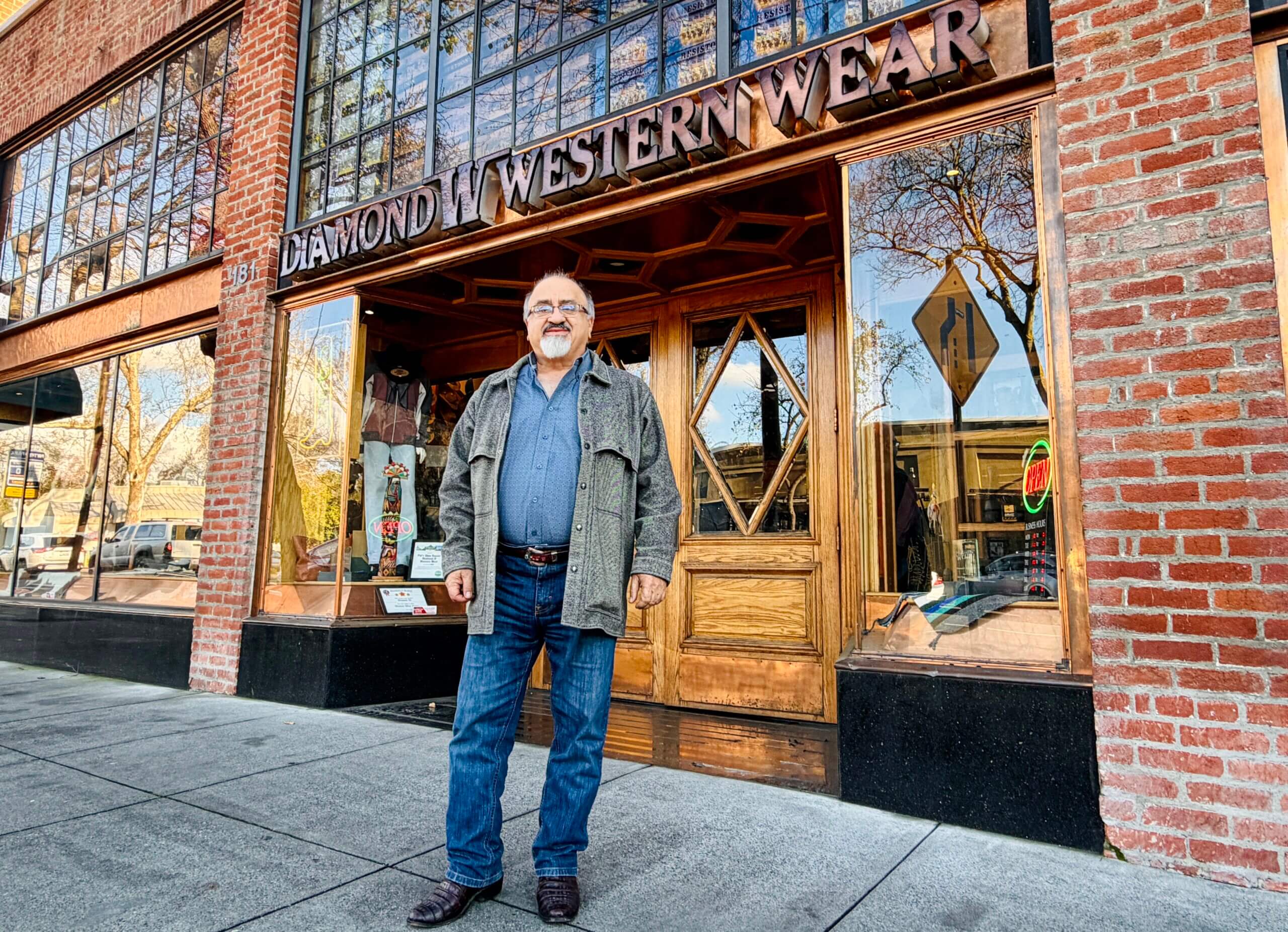
David Halimi grew up Jewish in Tehran, watching Bonanza. He now produces rodeos in Northern California and owns a bar modeled on Cheers.
At 73, Halimi is known around Chico as the man behind a Western wear store stocked with thousands of cowboy boots, a rodeo circuit that draws bull riders from across the region, and a U-shaped bar where locals joke about who might be the town’s version of Norm. Less obvious — but no less central — is that he is also a longtime synagogue president, a Hillel board leader, and a professor who teaches business analytics at the local university.
Asked how an Iranian Jew learned the rhythms of the American West, Halimi doesn’t mystify it. “I’m a quick learner,” he said.
Halimi still follows events in Iran closely. “It’s heartbreaking,” he said. “It’s my heritage.” He has no illusions about the imbalance of power. “People protesting with their bare hands are no match to machine guns and professional assassins.” Still, he allows himself hope. “I wish and I pray that the people will prevail.”
For Halimi, the distance between Iran and Chico is not just geographic. It is the distance between a life shaped by instability — he grew up in Iran in the aftermath of a coup — and one he has spent decades deliberately building.
On a recent afternoon inside the 6,000-square-foot Diamond W Western Wear, Halimi wore what he sells — black alligator boots, jeans, a button-down, blazer and a hat — and moved easily past towers of boots, glass cases of belt buckles, pausing as an employee steamed a cowboy hat back into shape. His wife, Fran, emerged from the back. Customers drifted in.
Over the years, his footprint downtown has expanded to include two restaurants and a soon-to-open coffee shop, all within walking distance of his store.
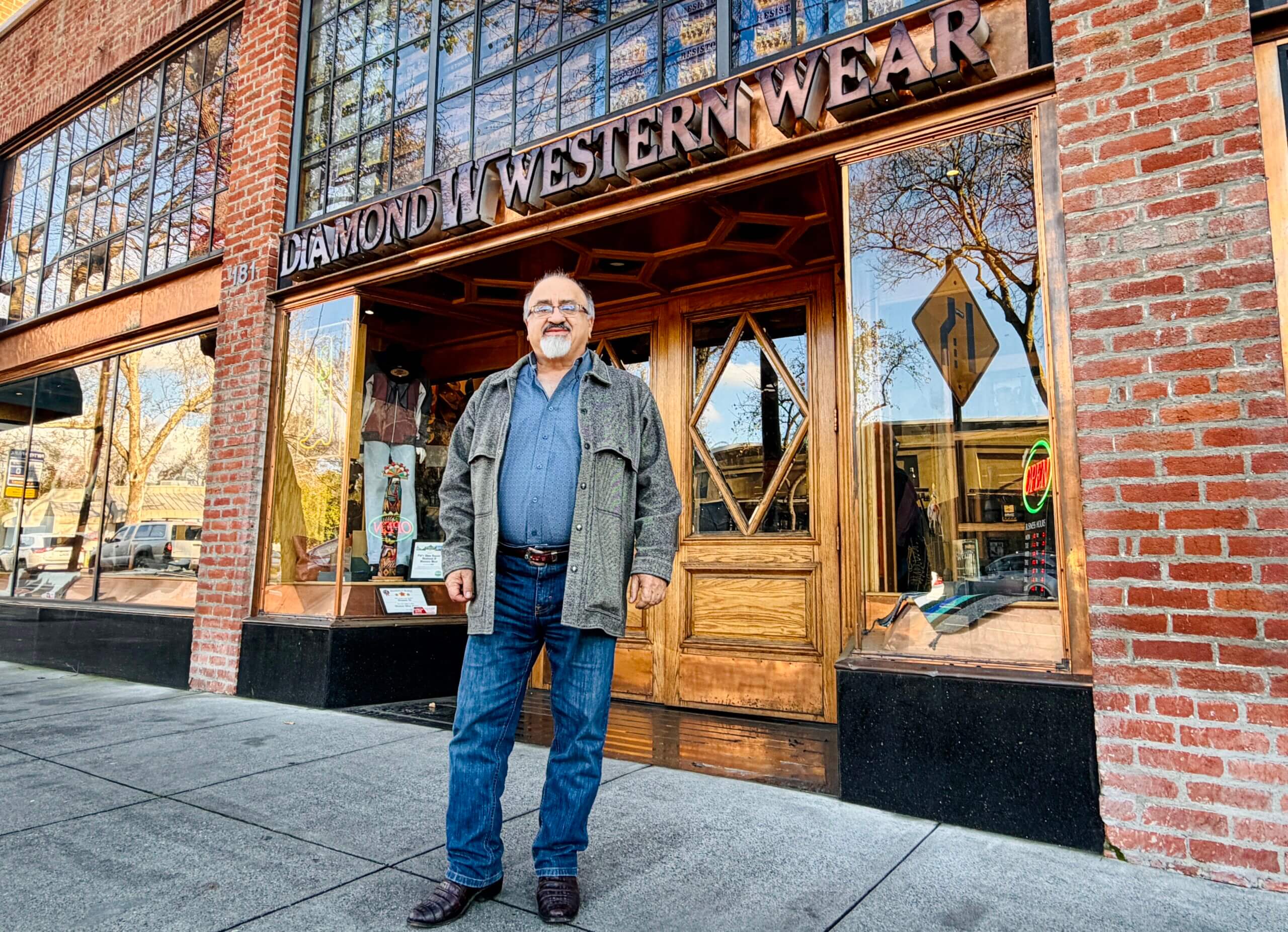
Halimi didn’t arrive in America looking for a job. He arrived looking for an opportunity. When he moved to the United States at 16, in 1969, he worked full time while going to school, bussing tables at a restaurant and saving aggressively. By 18, he had pooled his earnings with his older brother to make his first real estate investment. “I was never looking for a job,” he said. “I always wanted to do my own thing.”
That instinct carried him through college, where he studied mathematics and economics, and later into commodities trading — “the stock market on steroids,” as he put it — before settling in Chico in 1979. It had the virtues he was looking for: a small-town feel, a university’s energy, and room to build.
Mending fences, building community
For all the boots, buckles and bull riders, Halimi’s most consequential work happens closer to home. He has served on the board of Congregation Beth Israel of Chico for decades, including numerous stints as president, and has been a steady presence through the cycles that define small Jewish communities.
Rabbi Lisa Rappaport, who leads the congregation, said that constancy matters. In a community with limited resources, leadership often means stepping in wherever the need arises.
That was especially true after the synagogue was targeted with antisemitic graffiti in late 2022. What followed, Rappaport recalled, was an outpouring of support. Donations funded a new security system. A local metalworker volunteered to create a new sign. Another family, moved by the response, offered to pay for a fence.
Halimi volunteered to design and help build it. Vertical bars, he insisted, would make the synagogue feel like a jail. Instead, he created diagonal metal panels inspired by math’s golden ratio, incorporating stainless-steel symbols of the Twelve Tribes — a boundary meant to protect without closing the place off.
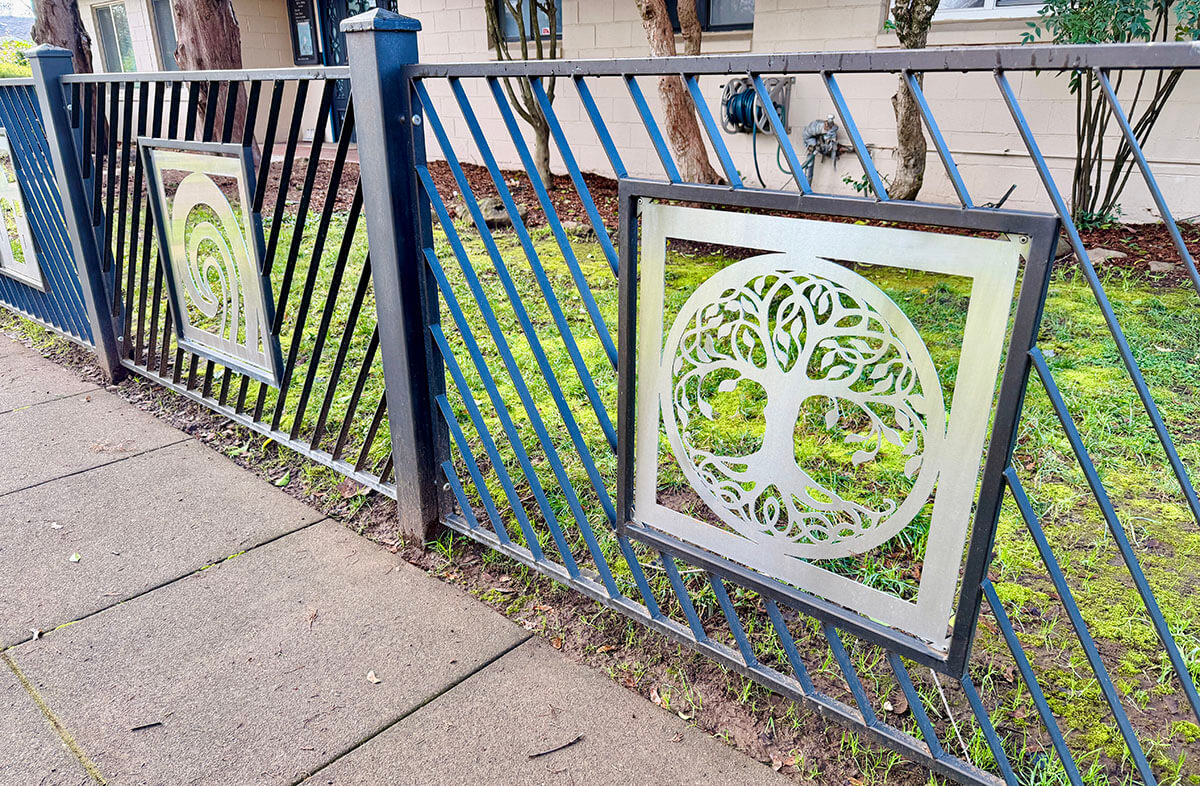
Rappaport credits both Halimi and his wife, a former religious school director and longtime sisterhood leader, with helping sustain the shul. “They’re in it till the end,” she said. In a small community, she added, that kind of commitment is existential. “If you have a couple of people who have that frame of mind,” she said, “it keeps the community alive. It’s people like that that keep it pulsing.”
Halimi, now a grandfather, carries that same lesson into his classroom at Chico State, where he has been teaching since 2009. Each semester he leads two courses: business analytics and the evolution of management theory. He doesn’t think of it as a job so much as a responsibility. “I like seeing the light bulb go on,” he said. Former students, now entrepreneurs themselves, sometimes track him down to say thank you. The payoff, he said, is “psychic income.”
Halimi teaches what he learned: “Even when the odds are against you,” he said, “you can still succeed.”
His rodeo business began, improbably enough, as a marketing complaint. Halimi had been sponsoring country concerts and rodeos to promote the store, but he was unimpressed with the results. Other sponsors, he noticed, felt the same way. So he launched his own production company. First, they hosted country music concerts. Soon, they built a rodeo: the National Bullriding Championship Tour, which just marked its 30th year.
He had expected resistance from the industry. Instead, he found acceptance, and eventually respect. “It’s very unusual,” he acknowledged, “for an Iranian Jew to be a successful rodeo producer.”
The post How a Persian Jewish immigrant became the rodeo king of California appeared first on The Forward.
Uncategorized
Argentina’s chief Sephardic rabbi reaffirms century-old ban on local conversions, sparking backlash
(JTA) — BUENOS AIRES — Argentina’s Sephardic chief rabbi reaffirmed a 100-year-old ruling that conversion may not be performed in Argentina and is considered valid only if carried out in Israel.
Representatives of non-Orthodox movements reacted angrily, asking why the ruling was issued now and saying it would essentially subject Argentinian converts to the tight hold that Israel’s Orthodox rabbis have on conversion.“Orthodoxy is attempting to present itself as the sole legitimate source of Judaism and halachic [Jewish legal] authority,” Rabbi Ariel Stofenmacher, the rector of the Seminario Rabínico Latinoamericano, the Masorti/Conservative movement’s seminary in Buenos Aires, told JTA. “We are concerned that members of the Jewish community in Latin America, where about 80 percent or more are not Orthodox, may read that statement by an important rabbi and feel confused.”
The document, issued on Jan. 13 and signed by Chief Rabbi Yosef Chehebar, reaffirms a takanah, or rabbinical ban, first established in Argentina in 1927. The authors of that ban, Rabbi Shaul Sitehon Dabah of the Syrian-Aleppo tradition and the Ashkenazi Rabbi Aharon Goldman, emerged in response to a proliferation of lax or irregular conversions, particularly in rural areas among Jewish immigrants.
The statement signed by Cheheber describes the ban as “general and binding.” It emphasizes that the decree was enacted permanently, “with no temporal limitation or expiration whatsoever,” and frames it as a safeguard for “the purity of lineage and the sanctity of our families.”
In the years since the original ban, however, non-Orthodox rabbis say the conversion process has been standardized, and that the level of preparation in Argentina is considered very high. The Masorti seminary, which has conducted conversions since its founding in 1994, argues that the reasons for the restriction “are no longer applicable.”
Critics of Cheheber’s document say there have been no recent incidents or developments that would have prompted such a reminder.
“We reject recent statements that invoke a cherem from the 1920s to invalidate conversions carried out outside the State of Israel and by non-Orthodox rabbis, as well as the use of language that appeals to notions of ‘lineage,’ ‘purity’ or ‘contamination,” the Seminario Rabínico Latinoamericano and its affiliated Rabbinical Seminary said in a statement Jan. 15. “Such claims are halachically unsustainable and ethically unacceptable, particularly when they introduce categories alien to Judaism and morally offensive.”
Rabbi Isaac Sacca, the Sephardi Chief Rabbi of Buenos Aires, posted Chehebar’s ruling on social media and defended it in an interview with JTA.
“The regulation represents a self-imposed limitation by Argentina’s Orthodox rabbis on their own authority, undertaken in order to ensure security and peace of mind that a practice as delicate and sacred as conversion is carried out with due seriousness, and that neither the convert, nor families, nor the community are misled,” he said.
Conversion has been a flashpoint between the diaspora and Israel, where the Orthodox rabbinate for decades held a near monopoly on Jewish lifecycle events, including conversion. Non-Orthodox conversions were recognized in Israel under a landmark ruling handed down by the Israeli Supreme Court in 2021, but non-Orthodox groups continue to object to government regulations that complicate the recognition of these conversions.
Conversion has been particularly fraught in Latin America, including the controversies that led to the 1927 takanah and, more recently, the mass conversion in Brazil, Colombia and other countries of people who identify as Bnei Anusim — descendants of Jews forcibly converted during the Spanish and Portuguese Inquisitions.
Within Orthodox circles in Argentina, preparatory stages for conversion may take place in the country, but the bet din, or rabbinical court, that validates them operates in Israel. According to sources who asked to remain anonymous, the target of the latest ruling was not the non-Orthodox movements but Orthodox rabbis who had been offering more flexible alternatives to prospective converts, such as completing an Orthodox conversion in neighboring Uruguay and then returning to Argentina to seek its recognition in Buenos Aires.
Chehebar’s recent statement specifies that the takanah “applies both to any person residing in Argentina, as well as to anyone coming from another country with the intention of establishing residence in national territory, even in cases in which the giyur [convert] has already been carried out in their country of origin or another country, outside of Eretz Israel.”
Asked whether any specific incident had triggered the statement, Sacca replied: “We are not aware of any particular event. It is simply a reminder that the Sephardic Chief Rabbinate of Syrian-Aleppo tradition has conveyed to our rabbinate for public dissemination.”
The ruling “does not constitute a rejection of the convert, nor does it devalue those who sincerely seek to join Judaism,” he added. “On the contrary, it functions as a halakhic safeguard designed to preserve a core commandment linked to Jewish identity, in a context marked by social pressures and institutional weaknesses. It also seeks to prevent hasty decisions that could affect the spiritual and personal lives of those seeking conversion, as well as those of their descendants.”
The Masorti movement insisted that its own rabbis conduct the conversion process in a manner that is “serious, demanding, and deeply Jewish,” based on rigorous study, commitment to Jewish life and responsible rabbinical guidance. “Those who join the Jewish people through this path,” the statement affirms, “are received as full Jews, with dignity and complete belonging, in accordance with rabbinic tradition.”
Said Stofenmacher: “We reaffirm that we conduct legitimate conversions in accordance with the halacha, as we have done for decades, with thousands of individuals who have joined the Jewish people in our region, and we will continue to do so in all the communities where our rabbis serve.”
The post Argentina’s chief Sephardic rabbi reaffirms century-old ban on local conversions, sparking backlash appeared first on The Forward.


